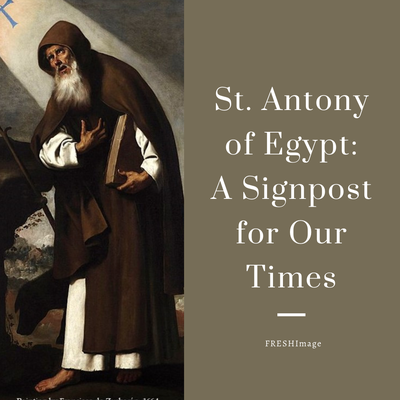Thoughts for the Day
Friday, 17th January 2025: Antony of Egypt, Hermit, Abbot (c251-356 CE)
Abbot Monastery Desert fathers Matthew 19 Saint
Reading : Verses from Matthew, Chapter 19

The Rich Young Man
Then someone came to Jesus and said, ‘Teacher, what good deed must I do to have eternal life?’ And he said to him, ‘Why do you ask me about what is good? There is only one who is good. If you wish to enter into life, keep the commandments.’ He said to him, ‘Which ones?’ And Jesus said, ‘You shall not murder; You shall not commit adultery; You shall not steal; You shall not bear false witness; Honour your father and mother; also, You shall love your neighbour as yourself.’ The young man said to him, ‘I have kept all these; what do I still lack?’ Jesus said to him, ‘If you wish to be perfect, go, sell your possessions, and give the money to the poor, and you will have treasure in heaven; then come, follow me.’ When the young man heard this word, he went away grieving, for he had many possessions.
Then Jesus said to his disciples, ‘Truly I tell you, it will be hard for a rich person to enter the kingdom of heaven. Again I tell you, it is easier for a camel to go through the eye of a needle than for someone who is rich to enter the kingdom of God.’ When the disciples heard this, they were greatly astounded and said, ‘Then who can be saved?’ But Jesus looked at them and said, ‘For mortals it is impossible, but for God all things are possible.’
(Lectionary, New Revised Standard Version)
Thoughts
Antony was a disciple of St Paul of Thebes. At the age of twenty he was a rich man after the death of his parents and having heard the message of Jesus he did as the gospel instructed, and then went to live in the desert. After 15 years he withdrew for absolute solitude to a mountain by the Nile called Pispir (now Dayr al-Maymūn), where he lived from about 286 to 305. During the course of this retreat, he began his legendary spiritual battles with the Devil which he overcame. These are famous in Christian theology and art work. Emerging from his retreat he organized the monastic life of the hermits who copied his way of life. His book of observances represented one of the first attempts to produce written guidelines for monastic living. Shortly after 313 he moved to a mountain in the Eastern Desert, between the Nile and the Red Sea where the monastery Dayr Mārī Antonios still stands. He ventured out twice to Alexandria, the last time to preach against Arianism, a heretical doctrine teaching that Christ the Son is not of the same substance as God the Father. He died on this day in 356 CE, and is considered to be one of the first of the Desert Fathers, and of those who first organized Christian monasticism. His simple rule of personal discipline and prayer was taken up and spread throughout Christendom.
Perhaps we can learn from Saint Antony's example in one simple way. We may not have visions as he did, but all of us face temptations. Our temptations will be different to his, but there will be a battle nevertheless if we are to overcome them. Can we think about our desires? A desire often hides a temptation! The desire to go for a walk on a sunny day means we can squash the temptation to do something that should be our priority. The desire to order a meal to be delivered can hide the fact that we were going to give that money to the local food bank. The desire to tell someone they are wrong can hide our pride that we feel we could do it better.
So can we all start to question what we desire, and check they are not really temptations, before asking for God's help.
Prayer
Collect
Most gracious God,
who called Your servant Antony
to sell all that he had and to serve You
in the solitude of the desert:
by his example may we learn to deny ourselves
and to love You before all things;
through Jesus Christ Your Son, our Lord.
Amen.
You might like to read this: